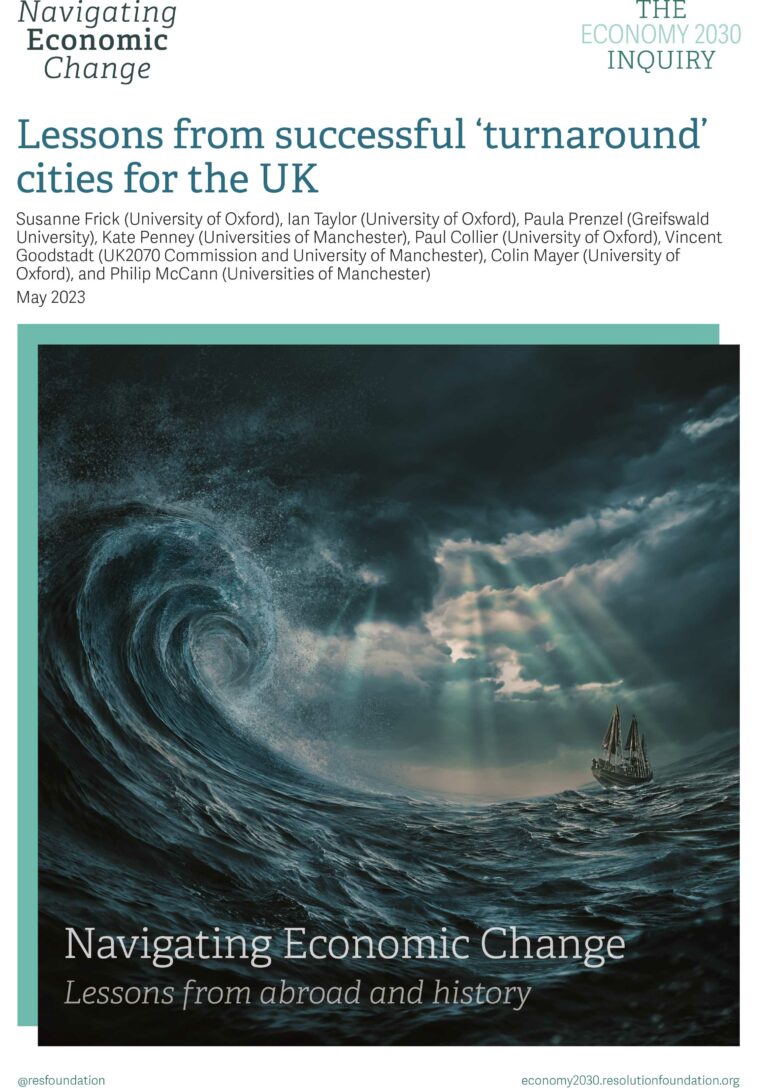What can the UK learn from ‘turnaround cities’?
Professor Philip McCann is a Co-Investigator at The Productivity Institute and the Chair of Urban and Regional Economics at The University of Manchester. He writes about the launch of the ‘Turnaround Cities’ report he co-authored that was published by the Resolution Foundation.
 What can the UK learn from post-industrial cities that have transformed their economies over the past 40-50 years?
What can the UK learn from post-industrial cities that have transformed their economies over the past 40-50 years?
That’s the question looked at in the Turnaround Cities report, which arose from eight case studies of cities that had been hit by de-industrialisation in the 1970s and 80s but have successfully turned their fortunes around.
The cities profiled were Lille (France), Bilbao (Spain), Pittsburgh (United States), Newcastle (Australia), Windsor (Canada) and Dortmund and Duisburg (Germany). A further case study was subsequently undertaken for Leipzig, Germany.
These cities are not perfect now, but their transformations over the past 30-50 years have been remarkable. And the common thread has been for communities to work together on a long-term strategy. They have similarities with UK cities such as Sheffield and Liverpool and their stories underline work by The Productivity Institute’s Tony Venables and Patricia Rice, where they detail how profound shocks have had 30 and 40-year effects.
For Turnaround Cities, we looked at documentation and held interviews, in the native language of the country, to get under the skin of decision making, particularly in the area of governance. The report features references to work published by the Institute and forms the backbone of new work we’re now undertaking in other places.
Our key takeaway is that a comprehensive strategy of urban renewal is needed to complement any economic strategy. It requires a unified vision and long-term strategy, powered by shared ownership and leadership empowered to make the big decisions and stick to them. These cities found ways locally to build coalitions and to overcome fragmentation.
Our six lessons from these turnaround cities were:
- One vision A holistic strategy covering urban development and economic development together to aid the transformation of the look and feel of a place so as to make people want to live and work there, and in turn, attract investment.
- One focus Comprehensive strategies for the promotion of the local economy are more effective than piecemeal and ad hoc approaches. Randomly scattered policies don’t work.
- Existing strengths Successful strategies are built upon a region or city’s existing strengths, rather than ‘cathedrals in the desert’.
- Leadership Empowering local and regional leaders with the resources and powers to make their own decisions was critical to the success of turnaround cities and in turn, gaining the trust of investors.
- Funding consistency Significant, stable and long-term funding and a strategic approach to funding.
- Collaboration Involving all parts of a city’s society in the vision, design, and implementation of the strategy
In Britain’s serviced-based economy, cities should be thriving. But major cities outside London are less productive that the national average. We think the UK can learn from these turnaround cities by:
- Giving decision making autonomy and power over the long-term for local leaders. Devolved areas for decision making need to make economic sense, be at scale and locally tailored. Most devolved decision-making units in the UK are too small and fragmented, making coordination limited.
- Creating meso-level institutions with real power that cover the large regional areas between the national and local levels – the missing middle – are critical for allowing the building of scale with coordination and credibility. The UK’s pyramid-shaped governance system is ill-equipped to help.
- Integrate spatial and land use planning with economic development plans.
- Provide finance for local startups and SMEs.
What could the UK do now?
The first step the UK needs take is to change in governance system which hinders devolved decision making. Our system is unique within the OECD and very centralised. Giving regions greater fiscal autonomy – to be able to make their own decisions with their own resources rather than waiting for central government – is key to starting the road towards more productive UK cities.
Further resources:
- Read the report, Turnaround cities: how post-industrial cities around the world have transformed their economies
- Read the full case studies
- Western Europe – Lille, France, and Bilbao, Spain
- Anglo-Saxon – Pittsburgh, United States; Newcastle, Australia; and Windsor, Canada
- Germany – Dortmund, Duisburg and Leipzig
- Read The fiscal implication of levelling up and UK governance devolution by Philip McCann
- Listen to the Productivity Puzzles podcast Industrial policy, institutions and fiscal mechanisms with Philip McCann, Diane Coyle and Andy Westwood.
- Read Tradability, Productivity and Regional Disparities: theory and UK evidence by Tony Venables and Patricia Rice



